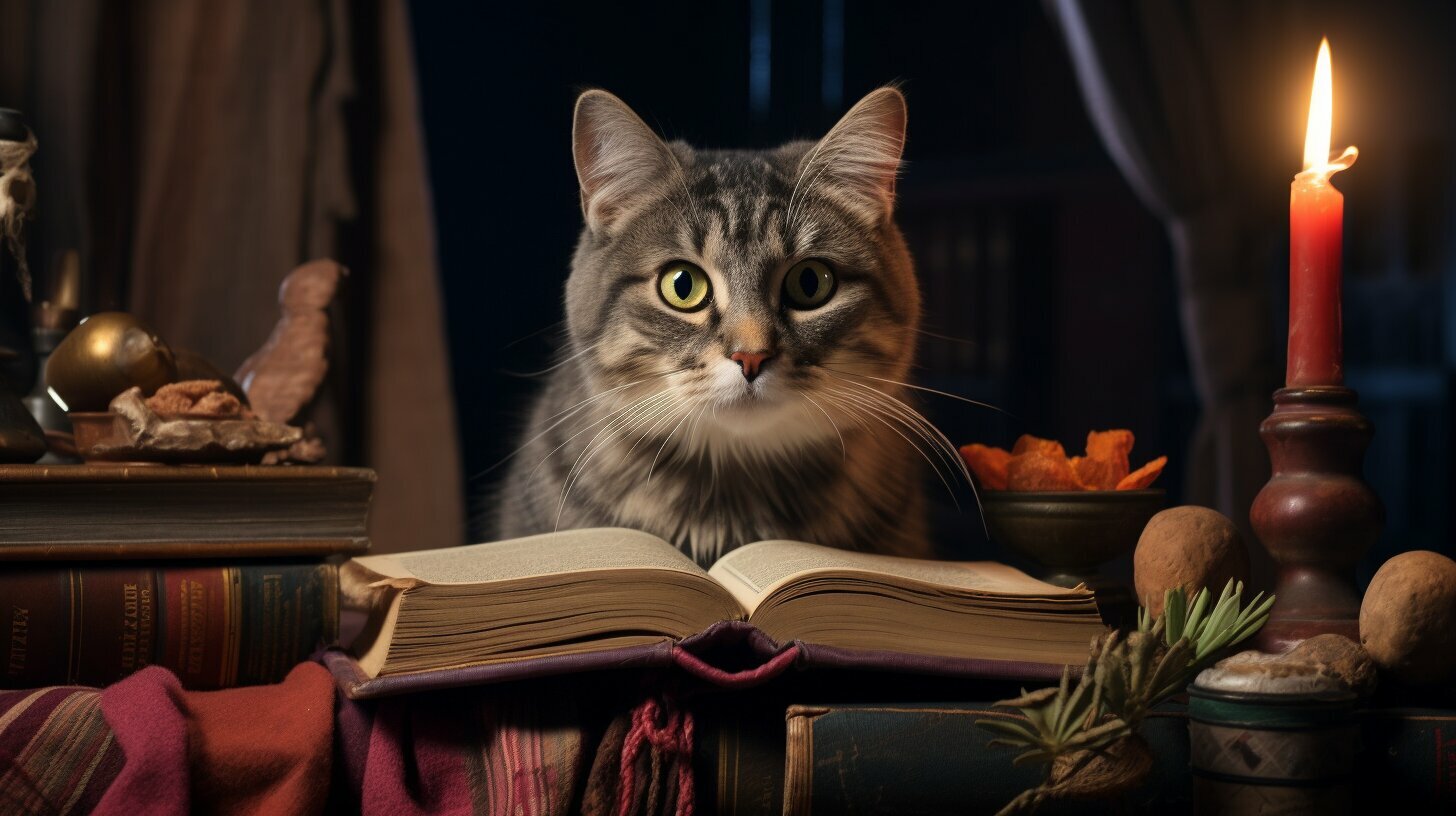Unraveling the Mystery: Why are Cats Called Pussies?
Have you ever wondered why cats are often called pussies? Join me on this intriguing journey as we uncover the fascinating history and linguistic background of this curious cat nickname.
Factual data: The origin of the word “pussy” meaning both a cat and female genitalia is unclear. It is believed that the term “pussy” first arrived in Britain from Germany in the 15th century as the word “puss” meaning cat, and later evolved to “pussy” to also mean coward and female genitalia. The connection between cats and female genitalia is not related to appearance; rather, it is likely steeped in homophobia and sexism. The phrase “raining cats and dogs” is an idiom used to describe a heavy rainstorm, and its exact origin is unknown. It is thought to have derived from the Greek phrase cata doxa, meaning “contrary to experience or belief.” Cats are drawn to the sound “pspsps” due to its higher frequency and resemblance to other sounds that cats pay attention to, such as the squeaking of rodents. The expression “raining cats and dogs” is not a metaphor or personification, but rather an idiom that conveys the idea of a torrential downpour.
Key Takeaways:
- The term “pussy” as a nickname for cats originated in the 15th century and evolved to also mean coward and female genitalia.
- The connection between cats and female genitalia is likely rooted in homophobia and sexism.
- The phrase “raining cats and dogs” is an idiom used to describe a heavy rainstorm and its exact origin is unknown.
- The sound “pspsps” attracts cats due to its higher frequency and resemblance to sounds that cats pay attention to.
- The expression “raining cats and dogs” is not a metaphor but an idiom that conveys the idea of a torrential downpour.
The Origin of “Pussy” for Cats
Let’s step back in time and discover how the word “pussy” came to be used for our beloved cats. The origin of this term is shrouded in mystery, but it is believed to have originated in the 15th century when the word “puss” was introduced to Britain from Germany, meaning cat. Over time, “puss” evolved into “pussy” as a nickname for cats.
The connection between the word “pussy” and female genitalia is not related to the physical appearance of cats. Instead, it is likely rooted in a historical context of homophobia and sexism. The term’s association with cowardice, as well as its connection to female genitalia, reflects societal attitudes and biases of the past.
While the exact origin of the idiom “raining cats and dogs” is unknown, it is commonly used to describe a heavy rainstorm. This expression is not a metaphor or personification, but rather an idiom that conveys the idea of a torrential downpour. It is believed to have derived from the Greek phrase cata doxa, meaning “contrary to experience or belief.”
| Origin | Meaning |
|---|---|
| 15th century | Introduction of the word “puss” meaning cat from Germany |
| Evolution | “Puss” evolves into “pussy” as a nickname for cats |
| Association | Connection to cowardice and female genitalia likely rooted in homophobia and sexism |
| Idiom | “Raining cats and dogs” represents a heavy rainstorm, origin unknown |
The Connection to Female Genitalia
Despite its seemingly innocent meaning, the term “pussy” for cats has a deeper connection to female anatomy. Let’s uncover the reasons behind this intriguing linguistic phenomenon.
The origin of the word “pussy” meaning both a cat and female genitalia is unclear. It is believed that the term first arrived in Britain from Germany in the 15th century as the word “puss” meaning cat, and later evolved to “pussy” to also mean coward and female genitalia. The connection between cats and female genitalia is not related to appearance; rather, it is likely steeped in homophobia and sexism.
In historical contexts, women were often associated with cats due to societal stereotypes and beliefs. The association between cats and femininity, particularly in relation to female genitalia, likely stems from these prevailing attitudes. The term “pussy” was used to demean and belittle women, reinforcing patriarchal power dynamics.
It is important to recognize that this linguistic connection is based on cultural bias and derogatory language, rather than any inherent characteristics of cats themselves. Cats are magnificent creatures, and they deserve to be celebrated without perpetuating harmful stereotypes or derogatory language.
| Key Takeaways: |
|---|
| The term “pussy” for cats has a deeper connection to female anatomy. |
| The origin of the word “pussy” is believed to have evolved from the word “puss,” meaning cat, in the 15th century. |
| The connection between cats and female genitalia is likely rooted in homophobia and sexism. |
| It is important to separate cats from derogatory language and harmful stereotypes. |
Cats and the Phrase “Raining Cats and Dogs”
Have you ever wondered where the phrase “raining cats and dogs” comes from? Join me as we explore the intriguing connection between cats and this peculiar meteorological idiom.
The exact origin of the phrase “raining cats and dogs” remains a mystery. While there are several theories, none can be definitively proven. One possibility is that the phrase derived from the Greek expression “cata doxa,” meaning “contrary to experience or belief.” This phrase was used to describe heavy rainstorms that seemed to defy common sense.
Although the term “raining cats and dogs” may conjure up comical images of animals falling from the sky, it is important to note that this idiom is not a literal depiction. Instead, it is an idiom used to convey the idea of a torrential downpour. The connection between cats and dogs and the heavy rain is purely metaphorical.
Cats, in particular, have a unique relationship with the phrase “raining cats and dogs.” Historical records suggest that cats were once associated with witchcraft and dark magic. During the time when this idiom originated, people believed that witches could control the weather and cause it to rain small animals, including cats. This association, coupled with the idiom’s catchy nature, may explain why cats are specifically mentioned in the phrase.
Table: The Historical Significance of Calling Cats Pussies
| Time Period | Significance |
|---|---|
| 15th Century | The word “puss” arrives in Britain from Germany, meaning cat. |
| Later Evolution | The term “pussy” also comes to mean coward and female genitalia. |
| Connection to Homophobia and Sexism | The association between cats and female genitalia likely stems from societal biases and prejudices. |
In conclusion, the phrase “raining cats and dogs” is a fascinating idiom with an uncertain origin. While the exact connection between cats and heavy rain remains unclear, historical superstitions and metaphoric usage shed light on why cats are prominently featured in this peculiar expression. Next, we will explore another intriguing aspect of cats: their peculiar response to the sound “pspsps.”
Cats and the Sound “Pspsps”
If you’ve ever tried to get a cat’s attention with the sound “pspsps,” you may have wondered why they react to it. Let’s uncover the intriguing reasons behind cats’ fascination with this specific sound.
Cats are known for their keen hearing and ability to detect even the slightest sounds. The sound “pspsps” is distinct in its high frequency and resemblance to other sounds that cats pay attention to, such as the squeaking of rodents. When a cat hears this sound, their instincts are triggered, and they immediately focus their attention on the source.
This peculiar reaction can be attributed to a combination of factors. Firstly, the high-pitched nature of the sound captures a cat’s attention because it stands out from the ambient noise in their environment. Cats have a heightened sensitivity to higher frequencies, making the “pspsps” sound particularly intriguing to them.
Additionally, cats are naturally curious creatures. The sound “pspsps” mimics the noises that cats associate with potential prey, like small rodents or birds. It taps into their instinctual hunting drive, triggering their curiosity and prompting them to investigate the source of the sound.
To better understand this phenomenon, imagine yourself hearing the sound of your favorite food being prepared in the kitchen. Your senses would sharpen, and you would be drawn to the source of the sound. In a similar way, when cats hear the sound “pspsps,” it triggers their primal instincts and captures their undivided attention.
| Reasons Cats React to “Pspsps” | |
|---|---|
| Distinct high frequency | The sound stands out and attracts their attention. |
| Resemblance to prey sounds | The sound mimics noises that cats associate with potential prey, triggering their hunting instinct. |
| Curiosity and instinctual response | Cats are naturally curious and are drawn to investigate unfamiliar sounds. |
Next time you want to engage with your feline friend, try using the sound “pspsps.” It can be a fun way to interact with them and tap into their natural instincts. Just remember to use it sparingly and with kindness, as cats are sensitive creatures who appreciate gentle approaches.
Conclusion
As we conclude this exploration into the origins and significance of cats being called pussies, we now have a deeper understanding of the linguistic and historical factors that contribute to this curious feline nickname.
Factual data: The origin of the word “pussy” meaning both a cat and female genitalia is unclear. It is believed that the term first arrived in Britain from Germany in the 15th century as the word “puss” meaning cat, and later evolved to “pussy” to also mean coward and female genitalia. The connection between cats and female genitalia is not related to appearance; rather, it is likely steeped in homophobia and sexism.
The phrase “raining cats and dogs” is an idiom used to describe a heavy rainstorm, and its exact origin is unknown. It is thought to have derived from the Greek phrase cata doxa, meaning “contrary to experience or belief.” Cats are drawn to the sound “pspsps” due to its higher frequency and resemblance to other sounds that cats pay attention to, such as the squeaking of rodents.
The expression “raining cats and dogs” is not a metaphor or personification, but rather an idiom that conveys the idea of a torrential downpour. This phrase serves as a vivid illustration of the intensity of a rainstorm, capturing the imaginations of generations.
With this newfound knowledge, we can appreciate the intricate web of history, language, and societal influences that have shaped our perception of cats as pussies. So, the next time you hear someone refer to a cat as a pussy, you can share the fascinating backstory behind this unique nickname.
FAQ
Why are cats called pussies?
The origin of the term “pussy” for cats is unclear. It is believed to have arrived in Britain from Germany in the 15th century as the word “puss,” meaning cat. Over time, it evolved to “pussy” and also came to mean coward and female genitalia. The connection between cats and female genitalia is likely steeped in homophobia and sexism.
What is the origin of the phrase “raining cats and dogs”?
The exact origin of the phrase “raining cats and dogs” is unknown. It is thought to have derived from the Greek phrase cata doxa, meaning “contrary to experience or belief.” This idiom is used to describe a heavy rainstorm and is not a metaphor or personification, but rather a vivid and imaginative expression.
Why are cats drawn to the sound “pspsps”?
Cats are drawn to the sound “pspsps” due to its higher frequency and resemblance to other sounds that cats pay attention to, such as the squeaking of rodents. This sound catches their attention and can be used as a way to call or attract them.
- Discovering Why Do Women Wear Lipstick: A Deeper Look - 19/12/2023
- Why Do Golfers Only Wear One Glove? - 16/12/2023
- Why Don’t Hobbits Wear Shoes? - 14/12/2023
Hi, I’m Rhiannon, the lead author behind The News Wire. As a passionate journalist, I strive to bring you the latest news and updates from all over the world. With a keen eye for detail and a dedication to unbiased reporting, I aim to deliver well-researched and informative articles that keep you informed and engaged. From breaking news to in-depth analyses, I cover a wide range of topics with the aim of keeping you in the loop. Join me on The News Wire as we explore the dynamic and ever-changing landscapes of global events, uncovering the stories that matter most.






